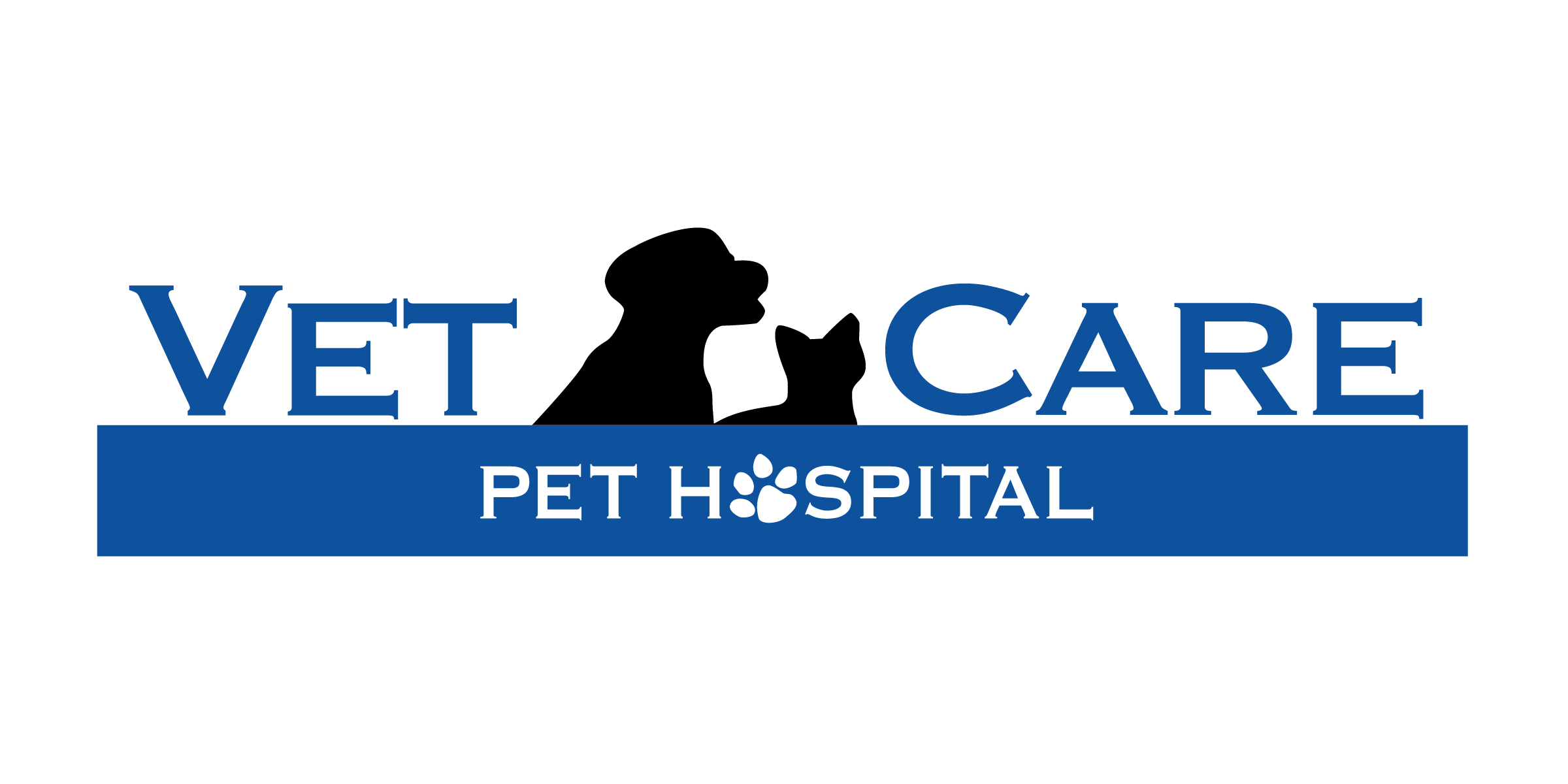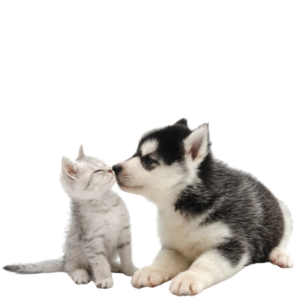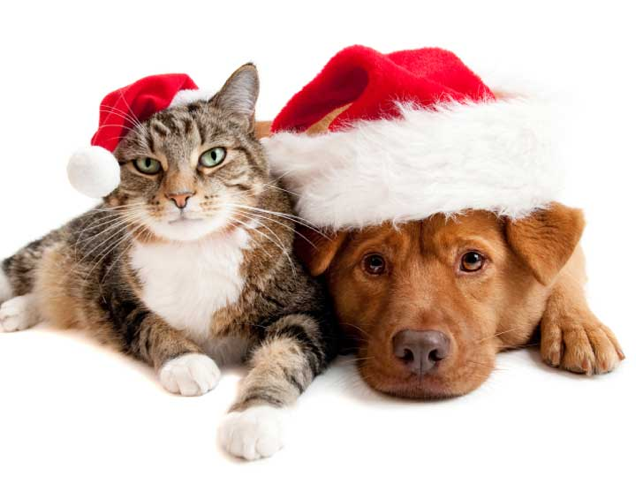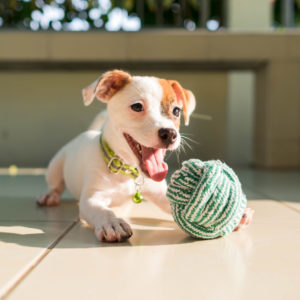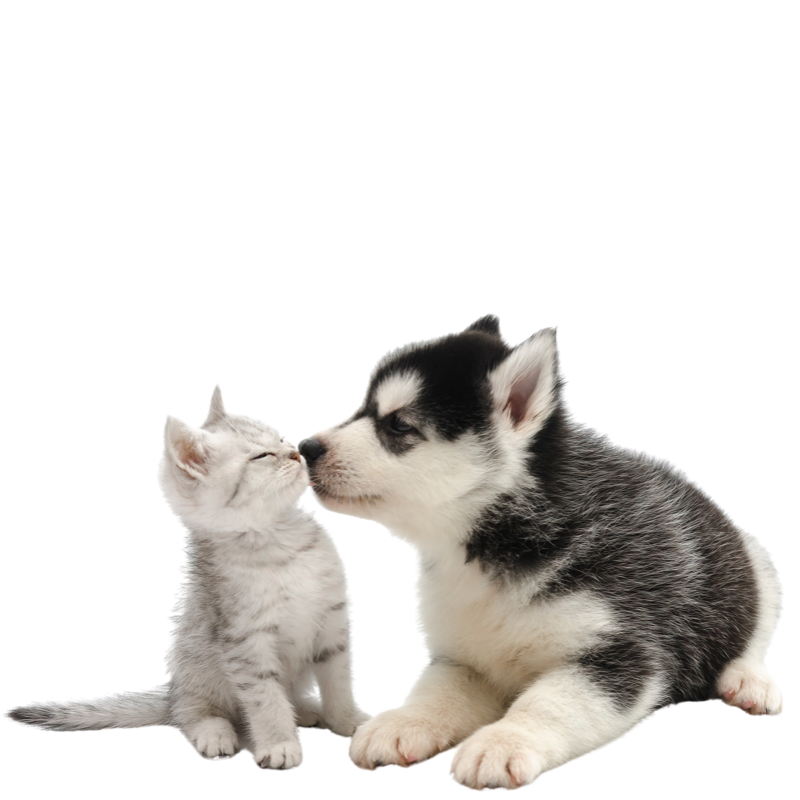The holiday season is a great time of year filled with family, friends, and giving. However, it is important to be aware of the different dangers that this celebration can pose to the four-legged members of your family, such as the following:
PLANTS
⦿ Poinsettias: The sap of this plant is irritating to the skin, eyes, mouth, and esophagus, and ingestion of the leaves may cause nausea, vomiting, sometimes diarrhea, or in rare severe cases, seizures or death. Also, as with any plant, if the poinsettia was treated with a pesticide, there is a higher risk of becoming ill.
⦿ Mistletoe: Both the plant and the berries are toxic to cats and dogs. A mild toxicity would cause drooling, vomiting, diarrhea, and other signs of gastrointestinal irritation, while a severe toxicity can cause an abnormal heart rate, low blood pressure, ataxia (walking like they are drunk), hallucinations, breathing problems, collapse, seizures, or even death. Keep it far away from your pets!
⦿ Holly: Like mistletoe, both the plant and the berries are dangerous, even if they are dried out. Ingestion can cause vomiting, diarrhea, drooling, lip smacking, and excessive head shaking. It’s best to opt for artificial holly instead this holiday season!
⦿ Lilies: Some lilies (ex: peace, Peruvian, and calla lilies) only cause minor symptoms like tissue irritation to the mouth, tongue, esophagus, etc. However, true lilies (Lilium or Hemerocallis species – ex: tiger, day, Easter, stargazer, and wood lilies) are extremely toxic to cats and could be potentially fatal, causing severe kidney failure. Even just ingesting a couple petals or leaves, the pollen, or the water from the vase causes this high toxicity. Lily of the valley is another type that is dangerous, potentially causing heart arrhythmias and death.
⦿ Daffodils: The bulbs of these flowers are covered in crystals that can cause vomiting, diarrhea, abdominal pain, tissue irritation, drooling, cardiac arrhythmias or even difficulty breathing when ingested.
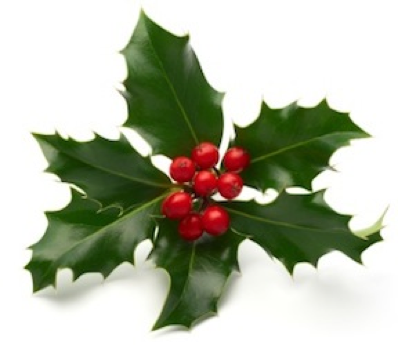
FOOD
⦿ Turkey: Even in small amounts, eating leftover turkey scraps or other fattening foods (gravy, other meats like ham or chicken, etc.) can be difficult to digest and cause severe, potentially fatal pancreatitis. You should also be sure to keep the leftovers in the trash away from your pet’s reach, as the turkey or chicken bones, both big and small, can be very dangerous and are highly likely to cause an intestinal blockage or to perforate the stomach/intestines.
⦿ Chocolate: This is probably the most widely known toxic food for cats and dogs. The symptoms and level of toxicity can range from mild to severe depending on the type of chocolate, how much was ingested, and how big the pet is. The general rule is the darker the chocolate, the more toxic it is. This is because it contains a higher level of theobromine, which is what causes this toxicity. The biggest concern is with baker’s chocolate and dark chocolate, which are often more popular during this season due to holiday baking and chocolate gift giving. Symptoms of chocolate toxicity include vomiting, diarrhea, restlessness, pancreatitis, high blood pressure, hyperthermia, tremors, abnormal heart rhythms, seizures, collapse and death.
⦿ Other Sweets: Sugary treats are not meant for our pets, and if they ingest a large enough amount, they will likely have a bit of an upset stomach. The big danger for dogs is the sugar-free sweet treats made with a natural, artificial sweetener called xylitol. This is also commonly found in chewing gums, mints, and toothpaste. Symptoms of xylitol ingestion can range from vomiting, weakness, black-tarry stool and lethargy to tremoring, collapse, jaundice or death, depending on the amount ingested.
⦿ Alcohol: This should be an obvious one, but alcohol poisoning in pets is more common than you think. This isn’t necessarily because of people flat out allowing their pets to drink alcohol (although those people do exist), but alcohol is present in more things than many of us realize. For example, unbaked bread dough is full of yeast, which can lead to alcohol poisoning. Ingestion of alcohol will cause symptoms such as vomiting, distended bloated stomach, low blood pressure, low blood sugar, hypothermia, weakness, collapse, seizures, difficulty breathing and in severe cases, death.
⦿ Other Toxic Foods: Other foods to avoid giving to your pets during the holiday season (or any time of year for that matter) include onions, garlic, grapes, raisins, bread dough, macadamia nuts, mushrooms, cherries and large amounts of salt.
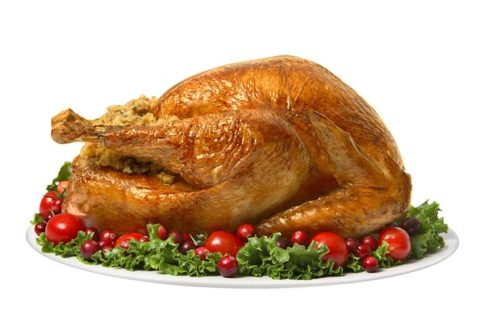
DECORATIONS
⦿ Christmas Tree: The Christmas tree is the most popular symbol for the holidays and often the main focal point when it comes to decorating. Unfortunately, like every other part of the holiday season, it comes with it’s set of potential dangers for your pets.
⦿ Fir trees produce oils that irritate the mouth and stomach and cause drooling and vomiting.
⦿ The needles that fall off the tree can also be dangerous because if they are ingested, they could cause GI irritation, and potentially puncture the stomach/intestines or cause an intestinal blockage. They could also get stuck in their paws if left all over the floor, so do your best to clean them up.
⦿ The standing water that nourishes the tree is a breeding ground for bacteria and moulds and could contain toxic fertilizers and some fallen needles. If your pet drinks this water, even just a few laps, they could end up sick with vomiting and diarrhea. Be sure to cover or barricade the water, so your pets can’t get to it.
⦿You should also secure your tree very well so that it doesn’t tip and fall over, potentially injuring your pet and also spilling that dirty water.
⦿ Be aware of what ornaments you put on the lower branches of the tree. They could cause an intestinal obstruction, choking, or injury from broken shards. Unbreakable ornaments are key. Also try to avoid edible tree decorations, such as popcorn strings, as they are very tempting for your pet to try to eat.
⦿ Tinsel: Since tinsel looks just like a shiny, sparkly cat toy, it’s not a surprise that our kitties like to play with and nibble on it. However, if they swallow it, they could end up with vomiting, abdominal pain, or an intestinal blockage, which would more than likely require surgery to fix.
⦿ Candles: This should go without saying, but don’t leave lit candles unattended! Your pet could burn themselves or knock over the candle and start a fire. If possible, keep candles out of reach of your pet and put them out when you leave the room.
⦿ Gift Wrapping: As with all of the other holiday decorations, your pet could end up with a GI obstruction if they ingest string, bows, wrapping paper, etc. Make sure you clean up everything after wrapping or opening gifts so that they don’t get into the mouths (or bellies) of your furry family members!

All of us here at VetCare are wishing you, your family and your pets a happy – and safe – holiday season! ☺
Written by Stephanie, RVT
